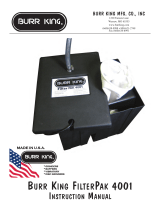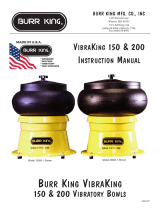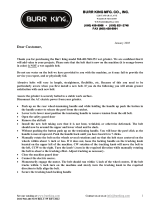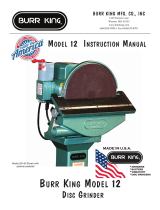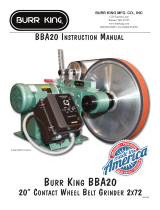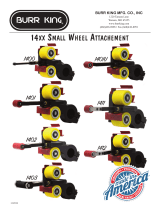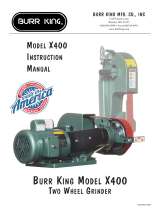Page is loading ...

BURR KING MFG. CO., INC.
1220 TAMARA LANE
WARSAW MO 65355
WWW.BURRKING.COM
(660) 438-8998
(800) 621-2748
FAX (660) 438-8991
February 2004
Installation/Operating instruction for the FilterPAK 4000
The FilterPAK 4000 provides filtration of vibratory fluids via replaceable filter bags, gravity settling, and a flow over
baffle. The replaceable filters are available from Burr King Manufacturing in 5, 10, 15, 25, 50, and 100-micron meshes.
Select finer mesh (i.e. 10 micron vs. 100 micron) for greater filtration. Finer mesh filters will have shorter service life
than filters with coarser mesh, but will provide clearer filtration and thus cleaner vibratory processing. The standard
filter that is provided with the FilterPAK 4000 is 15-micron mesh.
To place your FilterPAK 4000 in service follow these instructions (if you purchased the FilterPAK 4000 as a part of a
vibratory system from Burr King go to step 4):
1. Install a 1/2 (3/8 with VibraKING bowls) male barb into the drain outlet of your VibraKING chamber.
2. Connect the 1/2-inch (3/8 with VibraKING bowls) clear plastic hose between the input to the FilterPAK 4000 and the
chamber output drain.
3. Secure the 1/2-inch hose to the chamber barb, and to the FilterPAK 4000 input tube with the clamps provided.
4. Route the 1/4-inch pump tube from the chamber input to the pump connection. Pass the tube and the pump power
cord through the 1 inch hole of the protective rubber grommet in the lid of the FilterPAK 4000. You may split the
grommet to accept the pump power cord and fluid feeder tube.
5. Connect the clear plastic hose from the chamber drain to (or through) the tube fitting on the lid of the FilterPAK
4000. If the tube ID fits over the fitting used the supplied clamp to secure.
6. Place the pump into the bracket that is provided in the small chamber.
7. Add water to the FilterPAK to the level noted by the 1/2-inch hole found in the center baffle. At this fill level there
are 6 gallons of fluid in the FilterPAK 4000. Do not over fill the FilterPAK.
8. Add compounds (soaps) of the type and the ratios suggested by the compound manufacturer (Burr King recommends
BKS100, BKS60, and AR60 soap for de-burring and most surface moderation). In example, if the suggested ratio
is 2-oz. soap per gallon of water, add about 12 oz. of soap to the FilterPAK reservoir and mix with the 6 gallons of
water previously added. We recommend that you premix all fluids.
9. Adjust the metering valve on your vibratory chamber to the desired fluid flow rate. The pump that is provided with
the FilterPAK 4000 is capable of providing 140 gal./hour at a 36-inch rise. In general a fluid flow rate of 1 to 2 gallons
per hour per cubic feet of chamber capacity is nominal, this flow occurs with the metering valve at about 60 degrees off
line.
10. The filter in your FilterPAK 4000 will require periodic change. The length of time between changes will vary
depending on the capacity of your chamber, the media type you are using, the chamber liquid flow rate, the material you
are processing, the mass of your material, and naturally the mesh size of the filter you use. As a reference point a 15
micron filter with 250 pounds of P20 media in a 4.5 cubic foot chamber processing 50 pounds aluminum, at a fluid flow
rate of 4 to 6 gallons/hour will sustain useable fluid flow and sludge filtration for about 12 hours. When the filter nears
replacement time you will note that fluid backs up in the clear drain tube such that there is no air pocket visible. To
replace the filter remove the 3 wing nuts, lift the top of the FilterPAK free, remove the filter. Install the new filter and
reassemble the FilterPAK. You will find it helpful to have a bucket handy into which you should place the depleted
filter (including its fluid and sludge contents). Later, after the filter has fully drained, remove the depleted filter from the
bucket and dispose of the filter and its dried contents in a responsible manner.
Note: Plastic and synthetic media will foam and will require more frequent filter changes than does ceramic
media. This is natural and unavoidable due to the composition of plastic media. Typically the life of filters when
plastic media is used will be less than ½ that of filters when ceramic media is used.
11. Periodically clean out the sludge that will form in the bottom of the FilterPAK. Most of this sludge deposit will
occur in the larger chamber. Do not allow the sludge to accumulate deeper than 1/2 inch in either chamber.
12. Add water and soap to your FilterPAK as required to keep the fluid level between above the pump inlet (about 4
inches minimum) and the 6-gallon mark (1/2-inch hole in the center) in the baffle. DO NOT RUN THE PUMP DRY.
Running the pump dry may damage the pump as it will have inadequate cooling.
13. Dispose of the depleted (filled) filters in a responsible manner. Generally, the filter bags can be
disposed in public landfills when material such as steel, iron, aluminum, and copper are processed: however,
See our catalog at www.burrking.com Contact us at info@burrking.com
DOC4000OP-99 02/04
1

See our catalog at www.burrking.com Contact us at info@burrking.com
DOC4000OP-99 02/04
2
you should consult with your local authorities for specific requirements and instructions in regard to disposal
of all waste materials.
Operating tips for your FilterPAK 4000
1. During the first few hours of operation after the installation of new media:
• The drain tube from the vibratory chamber to the FilterPAK 4000 may plug. This is a consequence of the new
media sloughing off edge particles that may not gravitate into the filter bag. Should you observe particles
collecting in the clear drain hose tilt the hose to allow the particles to flow into the FilterPAK 4000.
Alternately, disconnect the hose and allow the particles to escape into a bucket for disposal. Reconnect the
hose. If the hose becomes fully impacted the FilterPAK 4000 will pump dry prematurely and the available
fluid will collect in the vibratory chamber. If this occurs it will be necessary to stopper the chamber before
removing the clear drain hose to prevent spillage. It may also be necessary too forcibly dislodge the hose
impaction using a rod or similar device.
• The filter bag may require changing after 2 to 4 hours of operation or less if plastic media is in use. This is a
natural consequence of “break-in” of the media. Larger, coarser media will create more initial debris than will
smaller finer media.
• After media “break-in” change the filter at regular intervals (see previous discussion on page 1). Keeping the
filtration system clean will pay dividends in media life, reduced cycle times, and part cleanliness.
2. Use a 5-gallon bucket or similar container to place exhausted filters into after removal from the FilterPAK 4000.
Doing thus will provide you a handy way to avoid spillage since the exhausted filter will have some liquid trapped, and
also provide a place for the filter to dry in preparation for disposal. It is not uncommon to trap two or three pounds of
sludge in the filter.
3. Mix your water and compounds (soaps) in a separate, clean bucket. Add the fluid to the FilterPAK 4000 (or to the
vibratory chamber) as required. Doing thus will assure that you maintain the proper ratio of compound to water.
4. Do not allow the pump to sit in a layer of collected sludge in the FilterPAK 4000. The sludge will harden over time
and damage the pump. Periodically, take your FilterPAK out of service and thoroughly clean out all sludge from both
chambers.
5. Periodically check the pH (acidity/alkalinity) of the vibratory fluids. As a general rule deburring media prefers a
pH of 8 to 11 (alkaline) when used on steel, aluminum, cast iron, copper, etc. Adding the recommended mixture of
vibratory soap to water that is pH neutral (7.0) will typically raise the pH to the recommended 8 to 11 range. As oils and
other contaminants are added as a natural consequence of the deburring process the pH may drop below the
recommended level. This may result in accelerated rusting and/or other staining of your material. Should this happen
replace the vibratory fluid with fresh fluid mixed per manufacturer’s instructions. There are several methods available
for measuring pH. Electronic meters are the most accurate and the most expensive. Litmus paper is inexpensive and
suitable for this purpose. Purchase litmus paper at drug stores, chemical supply houses, or through your local industrial
supply.
6. DO NOT USE FLUIDS OTHER THAN WATER (with approved soaps) in the FilterPAK 4000. Doing so may
create a fire or explosion hazard resulting in serious injury and/or property loss. Additionally, fluids other than water
and recommended soaps may attack the urethane liner of the vibratory chamber and significantly shorten its service life.
Burr King vibratory chambers are covered by warranty that is void if unapproved fluids are used.

BURR KING MFG. CO., INC.
1220 TAMARA LANE
WARSAW MO 65355
WWW.BURRKING.COM
(660) 438-8998
(800) 621-2748
FAX (660) 438-8991
Technical note:
Subject: Burr King Filter PAK 4000, filters October 2000
The Burr King Filter PAK 4000 is a closed loop compound delivery system that incorporates a high
quality polyester felt membrane filter. The filter is rated at 25 gallons per hour, well over the necessary
flow rate for most vibratory systems. The filter is also rated for a pressure head of 12 feet (6 PSI).
Various filter mesh sizes may be used. The fluid moving through smaller mesh size filters will contain
smaller particulates than will fluid passing through larger filter mesh sizes. The following data is based on
Burr King P-20 ceramic media and serves as a guide for filter mesh size selection.
Filter mesh Traps particles (note 1) Est. effective life by BK model in hours (note 2)
size, micron larger then: 110 150S 200S 25 45 85
5 0.0002 inches 200 80 40 10 5 2
10 0.0004 inches 200 120 60 12 7 3
15* 0.0006 inches 200 140 80 18 10 4
25 0.0012 inches 200 200 100 36 20 8
50 0.0024 inches 200 200 200 60 36 16
100 0.0048 inches 200 200 200 80 48 20
Model approximate volume (cu. ft.) 0.15 0.5 1.0 2.5 4.5 8.5
* Filter PAK 4000 units include two 15-micron filters as standard.
Note 1: Human hair is approximately 0.003 inches in diameter. Filters are rated by the size of particle that will, with
high probability, be trapped. This also means that a small percentage of larger particles will escape and stay in
solution.
Note 2: Effective life is the point in time when the filter flow rate drops to 50% of rated value. Effective life will
vary greatly depending on the media used, flow rate metered, material being processed, and the volume and energy
of the vibratory system.
Burr King recommends 15-micron filters for most ceramic media applications. We recommend 50 or 100
micron filters for most plastic media applications. When greater fluid clarity is required, or fewer residues
remaining on parts is desired select a smaller filter mesh size. Compounds such as anti-rust and soaps will
pass through the filters and remain in solution. The filters will trap compound additives such as plastic
anti-stick beads. Remember that smaller mesh size filters will require more frequent changes.
Filters are available from Burr King by individual mesh sizes in packs of 5, 10, and 25 filters/pack.
See our catalog at www.burrking.com Contact us at info@burrking.com

Filter PAK 4000 Filter Prices
Filters sold by micron mesh size in kit quantities of 5, 10, & 25
PART NO. MICRON QUANTITY PRICE
FP-5-5 5 5 $28.00
FP-5-10 5 10 $52.00
FP-5-25 5 25 $127.00
FP-10-5 10 5 $28.00
FP-10-10 10 10 $52.00
FP-10-25 10 25 $127.00
FP-15-5 15 5 $28.00
FP-15-10 15 10 $52.00
FP-15-25 15 25 $127.00
FP-25-5 25 5 $28.00
FP-25-10 25 10 $52.00
FP-25-25 25 25 $127.00
FP-50-5 50 5 $28.00
FP-50-10 50 10 $52.00
FP-50-25 50 25 $127.00
FP-100-5 100 5 $28.00
FP-100-10 100 10 $52.00
FP-100-25 100 25 $127.00
*Prices/Spec. may change without notice. Prices are in US$, outside of US consult with factory
3/1/2005 REV.A
ADVANTAGE
Fine micron best for porcelain media, medium micron best for ceramic, coarse micron best for plastic medias
BURR KING MFG. CO., INC
.
1220 TAMARA LANE
WARSAW, MO 65355
WWW.BURRKING.COM
(660) 438-8998 (800) 621-2748
FAX (660) 438-8991
1/4
